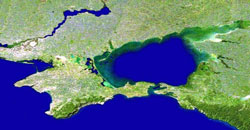KIEV, UKRAINE: Just as the latest Ukraine-Russian situation is much more than a simple case of Russian aggression, so too are the geopolitical implications more far-reaching than a regional energy crisis alone.

Russia's annexation of Crimea has triggered the worst crisis between Russia and the West since the end of the Cold War. (Image: NASA)
The truth is that Russian intervention could well cause a civil war in Ukraine, between the fiercely nationalist residents in the poorer western regions of the country and the heavily Russian population in the highly industrialised eastern region.
And on a broader scale, a politically independent Ukraine, which now depends upon Russia for roughly 65% of its energy supply, could well decide to replace the Russian imports with LPG from the United States for the immediate future, at least until Ukraine could ramp up its own domestic production sufficiently to wean itself off all energy imports.
Win-win for US; lose-lose for Russia
By filling the gap in Ukraine's energy needs for the better part of the decade, the US would be gaining an even greater influence in the region than it already has, as well as reducing the US' trade deficit while increasing Russia's - a situation that the Russians find untenable.
The long-term benefit to Ukraine would be significant, since it would ultimately be released from the energy-based stranglehold that Russia has had for so long, not only over Ukraine, but over Europe as a whole. Such a move could further embolden other EU countries' efforts to reduce or even eliminate their near-total dependence upon Russian energy sources, something that could motivate the imperial-minded Putin to possibly embark on additional acts of aggression against the EU.
The potential to create a crisis
It would appear that most of the potential scenarios could serve to cause at least a significant interruption in the flow of energy resources from Russia to Ukraine and ultimately to other EU countries, as well. Were a civil war to break out within Ukraine, there is little doubt that the Russian military would support their fellow Russians in the east, thereby gaining control of the vast majority of the country's productive industries, and potentially shattering the already fragile economy in the western regions. The EU, NATO, and the US would likely offer at least materiel support to the East, which would exacerbate the already strained relations with Russia, quite possibly leading to Russia decreasing or even stemming the flow of much-needed oil and gas to Europe, while an energy-hungry China stands eager to purchase as much energy as Russia can provide.
Taking all the possible - and probable - political and economic ramifications into account, the conflict in the Ukraine holds the very real potential not only for an energy crisis that would affect the entire world, but a political crisis that could be far more dangerous a precipice than that on which the world found itself during the worst days of the Cold War.








